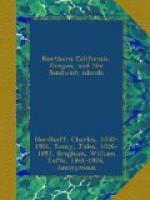Taro is a kind of arum. It grows, unlike any other vegetable I know of unless it be rice, entirely under water. A taro patch is surrounded by embankments; its bottom is of puddled clay; and in this the cutting, which is simply the top of the plant with a little of the tuber, is set. The plants are set out in little clumps in long rows, and a man at work in a taro patch stands up to his knees in water. Forty square feet of taro, it is estimated, will support a person for a year, and a square mile of taro will feed over 15,000 Hawaiians.
[Illustration: The palace, Honolulu.]
By-the-way, you will hear the natives say kalo when they speak of taro; and by this and other words in common use you will presently learn of a curious obliquity in their hearing. A Hawaiian does not notice any difference in the sounds of r and l, of k and t, or of b, p, and f. Thus the Pali, or precipice near Honolulu, is spoken of as the Pari; the island of Kauai becomes to a resident of it Tauwai, though a native of Oahu calls it Kauai; taro is almost universally called kalo; and the common salutation, Aloha, which means “Love to you,” and is the national substitute for “How do you do?” is half the time Aroha; Lanai is indifferently called Ranai; and Mauna Loa is in the mouths of most Hawaiians Mauna Roa. Indeed, in the older charts the capital of the kingdom is called Honoruru.
Society in Honolulu possesses some peculiar features, owing in part to the singularly isolated situation of this little capital, and partly to the composition of the social body. Honolulu is a capital city unconnected with any other place in the world by telegraph, having a mail once a month from San Francisco and New Zealand, and dependent during the remainder of the month upon its own resources. To a New Yorker, who gets his news hot and hot all day and night, and can’t go to sleep without first looking in at the Fifth Avenue Hotel to hear the latest item, this will seem deplorable enough; but you have no idea how charming, how pleasant, how satisfactory it is for a busy or overworked man to be thus for a while absolutely isolated from affairs; to feel that for a month at least the world must get on without your interfering hand; and though you may dread beforehand this enforced separation from politics and business, you will find it very pleasant in the actual experience.
As you stand upon the wharf in company with the elite of the kingdom to watch the steamer depart, a great burden falls from your soul, because for a month to come you have not the least responsibility for what may happen in any part of the planet. Looking up at the black smoke of the departing ship, you say to yourself, “Who cares?” Let what will happen, you are not responsible. And so, with a light heart and an easy conscience, you get on your horse (price $15), and about the time the lady passengers on the steamer begin to turn green in face, you are sitting down on a spacious lanai or veranda, in one of the most delightful sea-side resorts in the world, with a few friends who have determined to celebrate by a dinner this monthly recurrence of their non-intercourse with the world.




